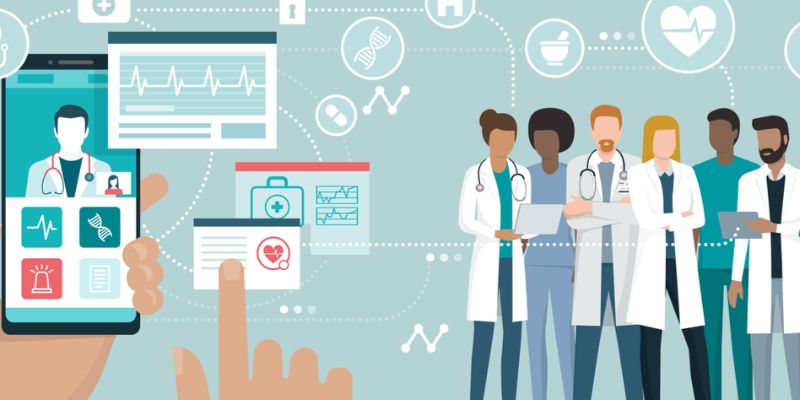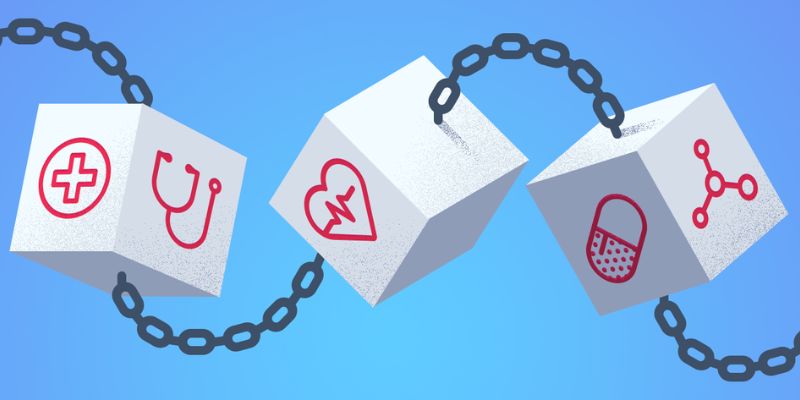Fixing healthcare is a tall order, but guess what’s playing a key role? How is blockchain used in healthcare? Simple: It ensures your health data stays safe and private. It means no more data leaks that make headlines. Blockchain makes sharing your health info safe, fast, and stress-free. Say goodbye to the fear of hacks and hello to high-speed, secure data exchanges. Making appointments and managing your records gets way easier. It’s not just a buzzword; it’s a game changer in how we treat and protect patient data. Join me as we dive deep into the world of healthcare on the digital edge. Let’s explore the nitty-gritty of blockchain—the tech that’s setting a new standard for health data security and delivery.
Blockchain-Enabled Data Protection and Patient Privacy
Enhancing Patient Data Security with Blockchain
Healthcare has a big job: keep patient data safe. Imagine a world where your health records are as secure as your online bank account. Blockchain technology in medical records is doing just that. It locks down our sensitive health info like a digital vault.
With blockchain, each piece of data is a unique block. It joins with others to form a chain. No one can change past blocks without a clear record. This stops hacks or leaks, helping us trust our data’s safety. Every time data moves, blockchain checks who’s involved and adds details to the chain.
This tech is smart, too. Smart contracts for healthcare give rules for sharing data. They make sure only the right eyes see your health story. This keeps your records between you and your doctor. Blockchain does more than lock down data. It literally chains it to us, giving us all peace of mind.
Cryptographic Protection of Health Data and Compliance
Staying private is key in healthcare. It’s about keeping secrets safe, like our health talks with doctors. Cryptographic protection of health data uses tough codes to guard our info. Think of blockchain as a super puzzle, one that’s different every time you use it. Only the right person can put it together and read the code.
This isn’t just good for keeping secrets. It also meets the rules of HIPAA compliance blockchain. These rules say how we must keep health information private and secure. With blockchain, hospitals and clinics can prove they follow the law. This keeps our trust in healthcare strong.
Experts are working hard right now. They find ways to use blockchain in our medical visits and treatments. This can cut down on mistakes and frauds—saving lives and money. Our medical IDs, drugs, trials—all can be safer with blockchain. Each step is about making sure our health journey is both private and shared right.
We’re facing big challenges in healthcare, but we’re also finding bright solutions. Blockchain could change the game, whether we’re fighting fake drugs or scanning our genes. It’s not just tech talk—it’s about you and me, staying healthy and secure in a connected world.
Advancing Healthcare Interoperability and Management
Streamlining the Management of Electronic Health Records (EHR)
Managing health records is tough, but blockchain makes it better. Imagine a super safe box that everyone trusts. That’s like blockchain for patient data. Hospitals use it to keep patient info safe and right where it needs to be. Doctors can see a patient’s history, so care gets faster and much better. Moving electronic health records (EHR) onto the blockchain means less mix-ups and less chance for hackers to sneak a peek. Smart contracts in healthcare? Yes! They’re like pinky promises that can’t be broken. If a patient says, “Only my doctor can see my health stuff,” blockchain makes sure it stays that way, no ifs or buts.
Blockchain isn’t just about keeping things under a tight lock and key; it also helps pills stay on the right path. Drug traceability is vital. It’s like keeping an eye on medicine from the start to when someone takes it. This way, we know it’s the real deal and safe. No one wants fake pills, right? Blockchain fights those fakes by tracking each step.
For those in white coats doing clinical trials, blockchain is their new best buddy. It takes care of all the data without a single piece getting lost or played around with. Think about it as an honest friend who never forgets.
Fostering Interoperable EHRs with Blockchain for Comprehensive Care
“I want my doctors to share!” That’s what patients might say if they knew how blockchain could help. Health info needs to flow right between doctors, hospitals, labs, and pharmacies. That’s interoperability. And guess what? Blockchain’s a champ at it. You visit a doctor here, another there, and they all know the latest about you. It’s like one big team talking and working together for your health.
Blockchain keeps personal health records (PHR) in one place, but it’s not the doctor’s drawer – it’s the blockchain. Safe and sound. And when we talk about how blockchain checks if medical folks are who they say they are – verification of medical credentials, it’s a big thumbs up for trust.
All this tech talk needs rules, though. Yes, there are health data exchange standards. They’re like playing nice in the sandbox, and blockchain is playing real nice. And the amazing part? It’s written in digital stone – immutability. Once something’s on blockchain, no erasing, no oopsies. It sticks. This means a patient’s “yes” or “no” to sharing their health secrets – patient consent management – stays put.
And those little slips of paper for medicine – prescriptions? On blockchain, it’s prescription drug monitoring like a hawk. Honest, clean, and super efficient. Plus, for those worried about someone else using their healthcare dollars – health insurance fraud prevention – blockchain’s on guard, keeping an eagle eye out.
In short, when everyone in healthcare gets along, sharing patient info effortlessly with blockchain, that’s interoperable EHRs at their best. It’s about connecting the dots for health’s big picture. With blockchain, those dots are safe, sure, and shared just right.
Streamlining Processes and Ensuring Drug Safety
The Role of Smart Contracts in Patient Consent Management
Smart contracts change how we manage patient consent. They are like digital pacts that auto-execute when terms are met. This process ensures only approved parties access health records, boosting patient data security. Imagine giving a doctor a key that only works when you say yes. That’s smart contracts for healthcare.
In clinics, getting consent takes time. Paper forms get lost or take forever to reach the right hands. With smart contracts, consent is instant and error-free. They store your yes or no safely on blockchain technology in medical records. This keeps your personal health data safe and out of the wrong hands. It’s a big step for privacy in healthcare.
Combatting Counterfeit Drugs with Blockchain-Driven Traceability
Fighting fake drugs is crucial. Counterfeit medicine can harm or even kill. Blockchain brings a powerful tool: drug traceability. Each pill or potion gets a unique ID on the blockchain. It tracks from making to taking. So, we can tell real from fake easily.
This isn’t just good for safety. It’s also great for trust. If a drug has blockchain proof, hospitals and pharmacies know it’s the real deal. That’s drug traceability doing its best. It’s like a detective that never sleeps. It watches over the supply chain to keep us all safe.
Blockchain doesn’t tire or make mistakes. Every step in a drug’s life, from factory to patient, links together. We see the whole journey. This stops bad drugs from sneaking in. It also helps manage electronic health records (EHR). Docs know what meds you take, and they’re sure they’re safe.
Smart contracts and drug traceability are just the start. They show us a future where healthcare is safe, quick, and sure. With them, our health is in good hands. Blockchain in healthcare isn’t just a buzzword—it’s a shield against risks, keeping us and our data secure.
Innovations in Health Data Utilization and Analytics
Blockchain for Health Data Analytics and Research Advancements
Blockchain technology is changing how we look at patient data. Imagine a library where instead of books, shelves hold secure medical records. With blockchain, this library gets really smart. It links records in a way no one can break or lose.
Now, what is blockchain technology in medical records? Simply, it’s like a digital ledger. It keeps patient info safe and sound. It also lets doctors and researchers share and study data without worry. This sharing is called enhancing data interoperability. It’s like building bridges between islands of medical data.
When healthcare folks use blockchain, they can take a deep dive into data for research. It helps find new ways to treat illness. They use something called smart contracts for healthcare. These are like secret codes that let info flow safely and quickly only where it should. Smart contracts help in many ways, like tracking drugs to ensure they are not fake, known as drug traceability.
Analytics? That’s just a fancy word for digging through data to learn stuff. With blockchain for health data analytics, we learn faster and better. We can spot what makes us sick and find ways to keep us healthy.
Now, think about how patient data security matters. Blockchain wraps data in a super-secure blanket called cryptographic protection. This means only the right people can peek into that blanket. This protection follows rules like HIPAA, which are like promises to keep health info safe.
Blockchain is also smart about who did what with the data, and when. This brings in the trust factor, which in fancy terms is called immutability of health records. Simply, it means records can’t lie about patient treatments or test results.
This technology is power-packed for use in clinical trials too. It can protect volunteer data and track trial results honestly. In blockchain for clinical trials, there’s no room for mistakes or missteps.
And there’s another cool thing. With blockchain, we can manage our own personal health records (PHR) in a safer space. It’s like each of us having a mini library of our health story that we guard with a secret key.
Achieving Transparency and Accountability in Healthcare Transactions
Blockchain does wonders for keeping things clear and honest in healthcare. That’s especially true with money matters. Healthcare transactions can get messy with bills, insurance, and payments.
But with blockchain, every penny has a clear trail. This is what we call transparency in healthcare transactions. Everyone involved can track where the money goes. For patients and insurers, this means less worry about health insurance fraud prevention.
Picture blockchain as a team of detectives. They make sure every deal in healthcare, every payment, and every consent form is clean and above board. It’s like putting sunlight on all the secrets. Blockchain shows who paid for what, who agreed to what care, who got which medicine.
In this world of secure healthcare, everyone plays fair. Trust is what holds health data exchange standards together. Imagine everyone following the same playbook, and blockchain guards that playbook. With blockchain, we set a new score for playing the health care game right. It brings everyone on the same team – doctors, patients, nurses, insurers – and makes the game of healthcare safe, sure, and shared.
We’ve seen how blockchain can change healthcare, making data safe and private. It locks health data with strong codes, meeting rules and keeping your info secure. This tech also makes sharing health records easier, so doctors give better care. It’s about connecting different systems for a full view of your health journey.
Smart contracts help manage your okay on how your data is used. This fights fake medicine too by tracking drugs from maker to patient. Lastly, blockchain boosts health data use. It lets us look at big health trends and keep records clear and honest.
Let’s sum it up. Blockchain can make healthcare better for all of us. It keeps our data safe, connects our doctors, and makes sure our medicines are real. As someone who knows this stuff, I believe blockchain is the way forward. Using this technology, we can expect a healthier future with trust at its core.
Q&A :
How can blockchain technology benefit the healthcare industry?
Blockchain technology offers numerous benefits to the healthcare industry by enhancing the security, privacy, and interoperability of patient data. By enabling a decentralized and tamper-evident record system, blockchain can provide a more secure and efficient method for sharing medical records, managing supply chains, and ensuring the integrity of clinical trials. Moreover, smart contracts on a blockchain can automate transactional operations, reducing administrative costs and increasing overall trust in the data exchange processes.
What are some applications of blockchain in healthcare?
Blockchain’s applications in healthcare are numerous and varied. It can be used for secure patient data management, where each individual’s medical history is cryptographically secured and shared only with permission. It is also applied in drug traceability to combat counterfeit drugs, allowing for transparent tracking of drug supply chains from manufacturer to patient. Furthermore, blockchain can streamline the management of health insurance claims and automate payment processes, reducing fraud and administrative costs. It is also being explored for its potential in managing consent in clinical trials and ensuring the authenticity of the collected data.
How does blockchain technology improve patient data security?
Blockchain technology improves patient data security through its unique structure. It creates an immutable ledger of all transactions, which means once a piece of data is recorded, it cannot be altered without changing all subsequent blocks and getting network consensus, which is computationally impractical to achieve. This protects against unauthorized tampering and cyber attacks. Additionally, the use of encryption and decentralized storage allows personal health information to be shared securely across different entities, ensuring that only authorized individuals have access to sensitive data.
Can blockchain technology help with healthcare compliance and regulation?
Yes, blockchain technology can significantly aid healthcare compliance and regulatory processes. Its inherent characteristics, like transparency, immutability, and traceability, make it an ideal platform to ensure and prove compliance with various health regulations. Smart contracts can automatically execute transactions that follow pre-defined rules, such as regulatory requirements, without the need for intermediaries. This not only streamlines compliance management but also facilitates real-time, verifiable reporting, making it easier to maintain and demonstrate adherence to industry standards and regulations.
Are there any existing blockchain healthcare projects or platforms?
Several blockchain healthcare projects and platforms are being developed and some are already in use. For example, Guardtime Health is leveraging blockchain for data integrity and transparency in healthcare processes. Additionally, IBM Blockchain is contributing to creating a secure exchange of health records through their blockchain platform. MediLedger is another platform focusing on the traceability of pharmaceuticals to prevent counterfeit drugs. Meanwhile, platforms like Patientory are empowering patients to take control of their own health information, providing secure storage and easy access to medical records. These projects illustrate the practical applications of blockchain technology in enhancing healthcare services and management.



